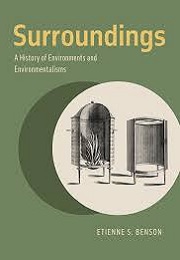Surroundings: A History of Environments and Environmentalisms

Etienne S. Benson
The University of Chicago Press, £22.00
Hippocrates said that ‘the chief virtue that language can have is clearness, and nothing detracts from it so much as the use of unfamiliar words'. But sometimes what might have seemed clear at one time can become murky at another. This is true to a certain extent with the concept ‘environment’. It was Hippocrates himself in his famous ‘Of airs, waters and places’ who emphasised the importance of a person’s surroundings on their propensity to become ill.
Much later it was the French physiologist (and vivisectionist) Claud Bernard who famously wrote that ‘the stability of the internal environment [the milieu intérieur] is the condition for the free and independent life.’ The idea of the milieu (either internal or external) as being important for both plant and animal life was fundamental to French scientists at the Muséum National d’Histoire Naturelle in Paris, in the late eighteenth century.
Their concept of environment forms the first chapter of a lively historical survey of the concept in epidemiology, sociology and ecology to the idea of world systems, the Gaia theory and Anthropocene.
Recent formulations of the idea of environment, especially the ideas of Bruno Latour, reveal that nature is no longer an inert background from which resources are extracted for human activities; rather, it has reclaimed its role as an active agent in the fate of the planet.
As with everything else today, the effect of Covid-19 may influence the ideas associated with the environment. As Paul Crutzen and his colleague Eugene Stoermer describe in their paper that first formulated the idea of the Anthropocene: ‘Unless there is a global catastrophe – a meteorite impact, a world war or a pandemic – mankind will remain a major environmental force for many millennia.’ As Sun Ra, the Afrofuturist musician and poet said: ‘the possible has been tried and failed. Now it’s time to try the impossible’. Or, as Bruno Latour says, the choice, even more starkly now, is ‘to modernize or to ecologize.’
Derek Charlwood


